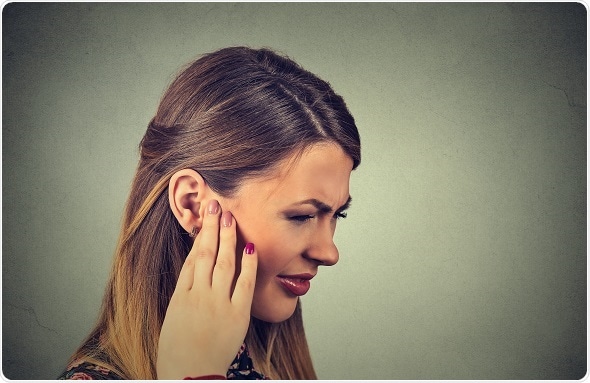For All The Latest Medical News, Health News, Research News, COVID-19 News, Dengue News, Glaucoma News, Diabetes News, Herb News, Phytochemical News, Cardiology News, Epigenetic News, Cancer News, Doctor News, Hospital News
Tinnitus refers to a condition where the patient “hears noises” in their ears even when there is no outside source of the sounds. These sounds may be soft or loud.

Sometimes tinnitus may sound like ringing, buzzing, humming, hissing, whistling, sizzling, clicking, knocking, roaring or blowing.
The sounds may be heard in one or both ears.
Some patients compare the sounds to those of insects like crickets, cicadas, or compare them to winds, falling water, gushing, grinding steel, escaping steam, running engines, chain saws, fluorescent lights, etc.
Many patients describe it to be coming from “the middle of their head”.
Tinnitus may be continuous or constant or may wax and wane. It may range from soft quiet sounds at times to loud disturbing sounds. (1, 2)
This is a common condition and almost everyone experiences tinnitus once in a while that only lasts a few minutes.
This may commonly occur to all individuals after exposure to loud sounds like at a sports arena or loud concert.
It may also be a temporary condition brought on by a cold or a blow over the head.
The tinnitus or ringing in the ears usually goes away after a short while. However in some individuals – in around 1 or 2 out of every 10 people - the condition may recur and persist.
This may interfere with ability to sleep or concentrate.
About 1 in 200 people may have tinnitus that disrupts their normal living.
Tinnitus is more common in older people but children and young adults can have it too.
A look at adults aged 48 to 92 years showed that 8.2% suffered from tinnitus at the beginning of the study and 5.7% new cases were added in a course of 5 years. With age the risk of tinnitus rises. (1, 2, 3)
Tinnitus may be caused due to various underlying pathologies. These include ear infections, foreign bodies or wax in the ear, injury to the ear caused by loud noises or a diseased condition called Meniere’s disease.
Meniere’s disease is a disease of the inner ear that leads to dizziness and hearing loss.
Tinnitus may also result from alcohol, caffeine, antibiotics, and aspirin and other drugs.
This condition may appear along with hearing loss and sometimes may be a primary symptom of another disease such as high blood pressure, anemia or an allergic condition.
Sometimes it may indicate a tumor called acoustic neuroma or a blood vessel deformity that is shaped like a balloon called aneurysm. (1, 2, 3, 4)
Tinnitus is divided into two categories (2):
The tinnitus in sufferers may go on for months or years and is more of an annoyance than disease.
However, when they start interfering with sleep or concentration or signify an underlying condition, treatment is needed.
Sometimes tinnitus is closely associated with symptoms of depression.
Treatment is not simple and comprises of a wide range of approaches each of which may not work for all individuals. (1)